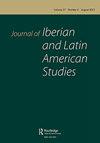独立后巴西的民主语言和“民主”语言,1822-48
IF 0.3
0 HUMANITIES, MULTIDISCIPLINARY
Journal of Iberian and Latin American Studies
Pub Date : 2020-05-03
DOI:10.1080/14701847.2020.1790229
引用次数: 0
摘要
本文探讨了1850年之前,民主的政治语言是如何在19世纪的巴西被使用的,以及它的部署是如何与相关但不同的政治概念联系在一起的,特别是自由主义和共和主义。它探讨了民主语言在君主立宪制下的流行,这种君主立宪制基于一种社会政治秩序,而这种秩序本身就依赖于奴隶制,在这种秩序中,绝大多数被奴役和自由的臣民,要么在事实上,要么在法律上被剥夺了公民权,要么被排除在政治进程之外。19世纪20年代至40年代,主要发生在远离首都里约热内卢的省份,包括赤道联邦、萨比纳达、法鲁皮哈和普拉埃拉等地的叛乱,本文着重分析了这些叛乱的政治思想。本文章由计算机程序翻译,如有差异,请以英文原文为准。
Demotic and “democratic” languages in post-independence Brazil, 1822-48
ABSTRACT This article addresses how the political language of democracy was used in nineteenth-century Brazil prior to 1850 and how its deployment was connected to related yet distinct political concepts, particularly liberalism and republicanism. It explores the prevalence of the language of democracy in a constitutional monarchy predicated on a socio-political order that was itself dependent on slavery and in which the vast majority of subjects, enslaved and free, were either de facto or de jure disenfranchised or excluded from the political process. The article focuses on the political ideas of the rebellions of the 1820s-40s, which mainly occurred in the provinces far from the capital of Rio de Janeiro, including the Confederation of the Equator, the Sabinada, the Farroupilha, and the Praieira.
求助全文
通过发布文献求助,成功后即可免费获取论文全文。
去求助
来源期刊

Journal of Iberian and Latin American Studies
HUMANITIES, MULTIDISCIPLINARY-
CiteScore
0.40
自引率
33.30%
发文量
23
 求助内容:
求助内容: 应助结果提醒方式:
应助结果提醒方式:


